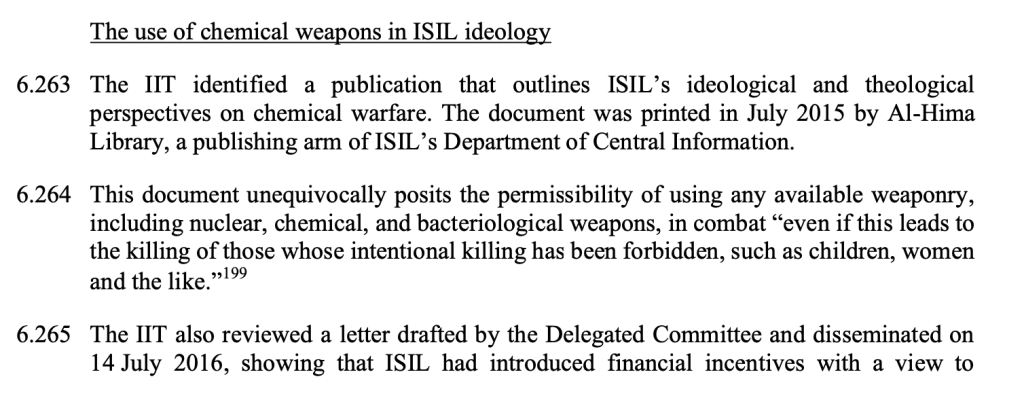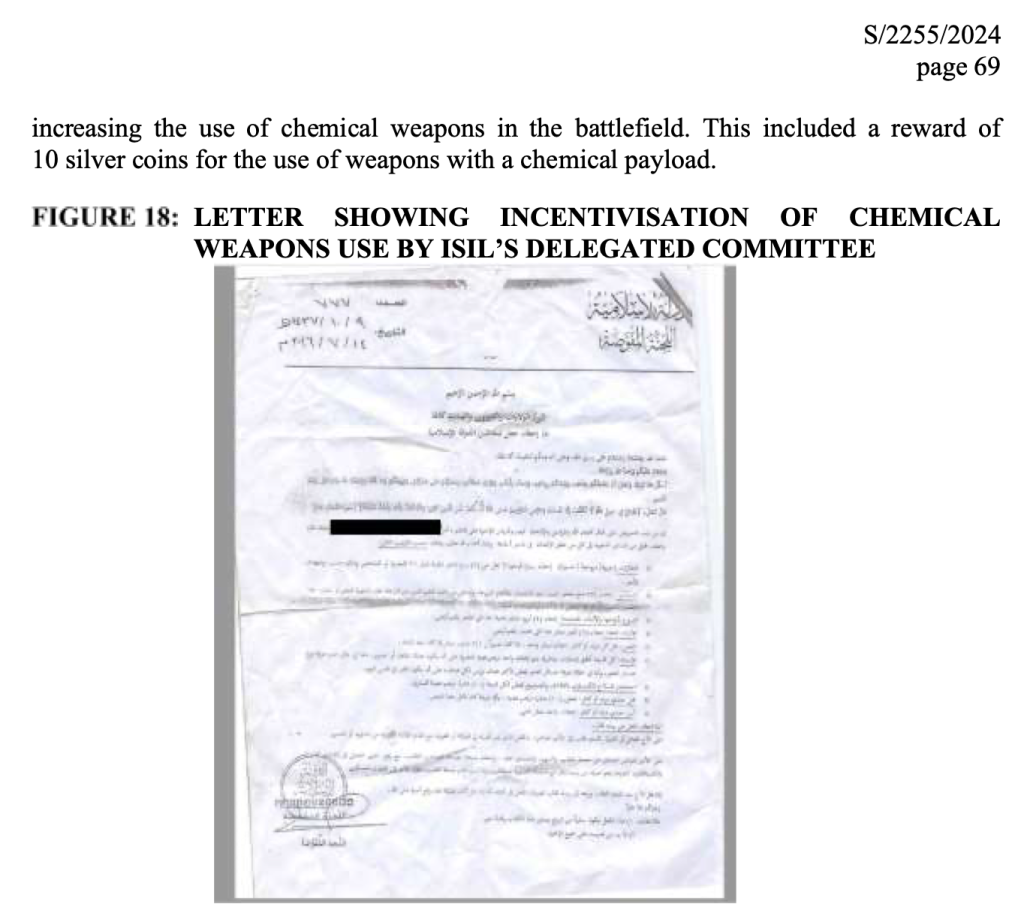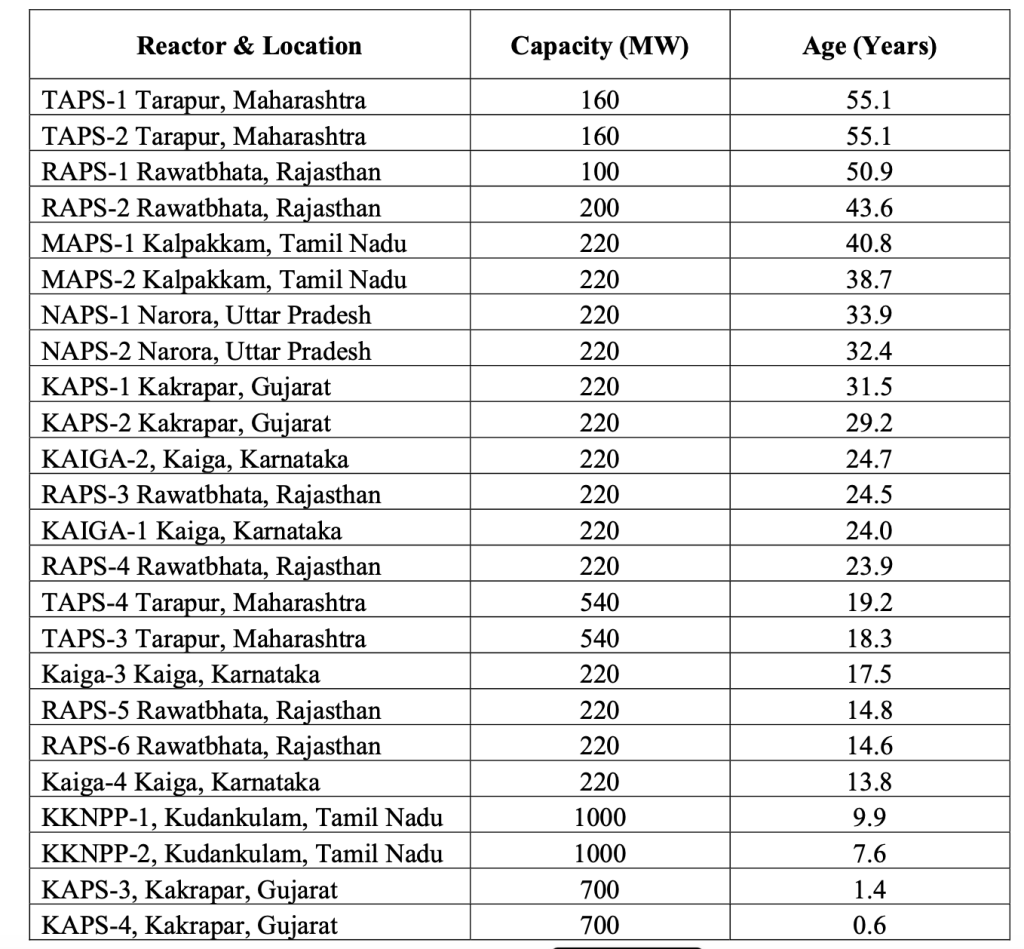Video from an ISSI event:
More February 2024 OPCW on ISIL and CW
OPCW on ISIL and CW, February 2024
This OPCW report is about a year old, but whatever.
The IIT concludes that there are reasonable grounds to believe that, on 1 September 2015, between 09:00 and 12:00 (UTC+3), during sustained attacks aimed at capturing the town of Marea, units of the Islamic State in Iraq and the Levant (ISIL) deployed sulfur mustard, using one or more artillery guns.
There’s a wealth of material, including this account of ISIL CW manufacturing:
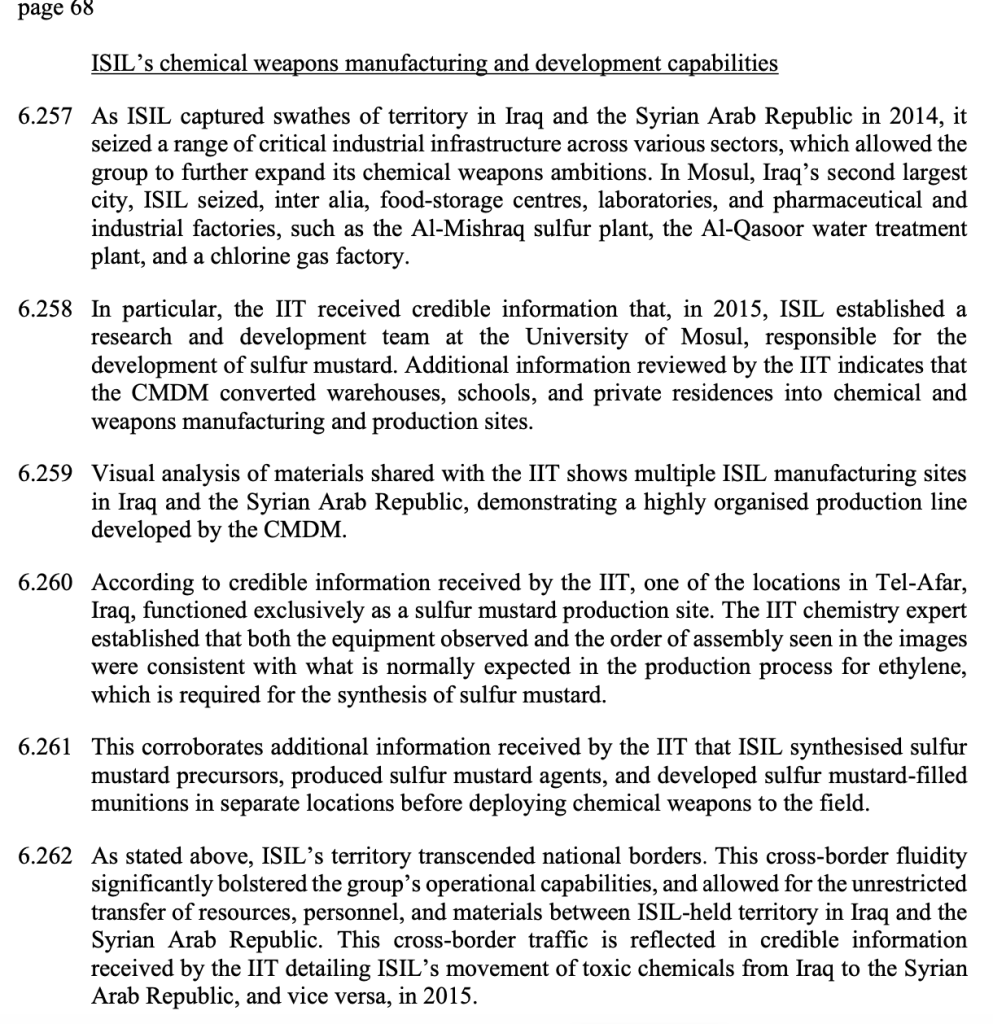
UNSG on ISIL and CW
Again late to the party, but this is from a July 2023 UNSG report:
The situation in Europe remained stable, with a slight increase in the number of thwarted terrorist acts, mostly against soft targets and places of worship. Most attacks were conducted by individuals without a direct affiliation with Da’esh, and some appeared to have been triggered by acts perceived as hostile towards Islam. According to one Member State, some of the attackers had aspired to use explosives and chemical toxins.
OPCW Action Plan for Syria
OPCW DG Arias presented the OPCW 9-Point Action Plan for Syria during his February 8 visit to Damascus.
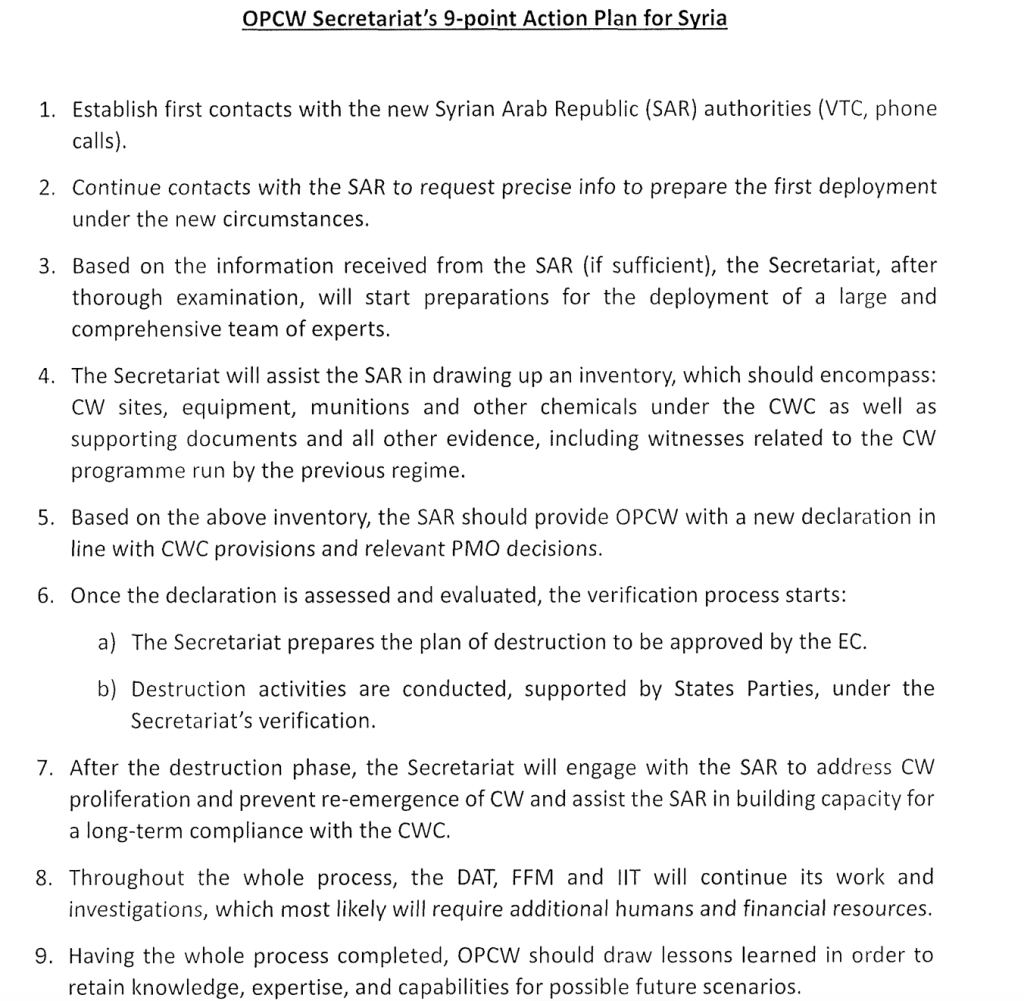
More from Nournews
Similar to the story I mentioned the other day, Nournews has another piece about possible US-Iran negotiations
Here’s an excerpt:
Some realities in the region and the international system also necessitate that Iran and the US take steps to manage and reduce tensions, and any escalation of tensions will not benefit either side or their interests and considerations in the region.
Seems to be a pattern.
Meaning of Indigenization
I’m genuinely not talking the piss, but here’s how the CEO of an Iranian “knowledge-based aerospace company” used the term “indigenized:”
Shahabi highlighted that over 85% of the components used in these satellites have been indigenized. “Even if all the components were imported, the design and construction of these satellites have been carried out entirely by local experts, making this project fully domestic,” he said.
Iran on Negotiations
From Nournews.
Contrary to the views of hardliners, the official position of the system is not to block the door to diplomacy and its tools. Based on its national interests, and considering the cost/benefit ratio as well as rational understanding and prior experiences, the system will make full use of these diplomatic capacities.
At a time when some political movements in Iran were stirring anti-diplomatic views within the country, the precise and enlightening words of the Supreme Leader on the day of Eid al-Mab’ath reminded the nation that the door to diplomacy and the strategy of negotiation and transaction remain open.
In the past week or two, opposition to the logic of dialogue, negotiation, and transaction in foreign relations expanded from parliament to the front pages of newspapers, eventually leading to the physical presence of protesters in some streets and squares.
The common thread in all these reactions was the outright rejection of diplomatic solutions, including negotiation. At the same time, some of the protesters interpreted the use of such diplomatic strategies as “selling out the homeland” and “leading Iran into the arms of the United States,” thus resurrecting and promoting the dichotomy of service/treason.
It is undeniable that within the realm of diplomacy and among international affairs analysts in the country, there are individuals or groups who hold unfounded optimism or haste in negotiating with Western parties.
These people, with a somewhat simplistic understanding, think that negotiation is merely an operational tactic that can be used, and if it does not yield results, it can be abandoned. Such a perspective may overlook the complexities of international relations and state-to-state political interactions, portraying negotiation as an inherently easy, harmless, and risk-free project. In other words, in contrast to the view that sees negotiation as a clear example of “selling out the homeland,” there is another view that sees no risk in negotiation and considers it a neutral act.
Intelligence in global interactions or “caution in transactions with countries,” as outlined in the Supreme Leader’s speech on Eid al-Mab’ath, positions itself precisely in the middle of these two extremes. Historical precedents show that negotiation, in itself, is neither something necessarily required nor something inherently risky and harmful.
What defines the identity of this diplomatic tool is the proper insight and careful attention towards it. In his speech, the Supreme Leader explained this concept using verses from the Quran, stating that negotiating and transacting with others should not be seen as neglecting the malice and hostility of enemies or as befriending them. Their enmity is far greater than what they express. This precise recommendation serves as a reminder of the undeniable necessity of “caution” during negotiation and transaction. It is not without reason that the following phrase from the Leader’s speech received considerable attention: “We must be careful with whom we engage and with whom we negotiate and speak.”
Thus, based on the Supreme Leader’s interpretation of the matter, it can be inferred that the dichotomy of negotiation/no negotiation, or transaction/no transaction, has lost its relevance, and a new, realistic concept of “intelligent and cautious negotiation or transaction” has emerged. It is worth noting that this concept had been mentioned earlier by the Leader, but it was always met with broken promises from Western parties. Therefore, it becomes clear that, contrary to the views of hardliners, the official position of the system is not to block diplomacy and its tools.
The Islamic Republic of Iran, at its highest levels, adheres to all communication tools, including diplomacy, negotiation, and reciprocal transactions, and will make full use of them based on its national interests, considering the cost/benefit ratio and relying on rational understanding and past experiences. It goes without saying that what is crucial in this process is to avoid oversimplifications and naïve thinking, which have led to unfavorable and unproductive results in previous negotiation processes.
On the other hand, the concepts outlined in the Supreme Leader’s words are also part of the fourteenth government’s ideological framework and action plans. Now, the government can pursue diplomacy in light of the enlightening views of the Leader, carefully following his recommendations. The proximity, or even alignment, between the fourteenth government’s foreign policy framework and the Leader’s realistic and pragmatic interpretation of negotiation and transaction, is a “possibility” and an “effective capacity” for utilizing the principles and tools of diplomacy.
At the same time, such clear alignment can be seen as a clear example of political consensus at its highest level. This consensus not only limits the hardliners at both ends of the political spectrum in Iran but also has the potential to be a valuable asset for the government in laying the foundation for a new era in Iran’s foreign policy.
Contrary to the expectations and interpretations of hardliners, the Supreme Leader’s speech on the day of Eid al-Mab’ath was not only about rejecting negotiation, but it also likely went a step further, incorporating a more actionable and practical stage, namely “transaction.” What is most important here is his repeated emphasis on using rational understanding, historical experiences, and calculating the cost/benefit ratio, and above all, not trusting the superficial smiles of Western parties. It must now be declared that Iran remains committed to diplomacy and will make intelligent and realistic use of all its capacities, especially the tools of negotiation and transaction, in its global interactions.
Interesting, especially given the source.
Status of India Nuclear Power Reactors
This answer to the Rajya Sabha by the Minister of State for Personnel, Public Grievances & Pensions has a list of nuclear power reactors in India
The statement adds:
At present, there are eight nuclear power reactors with a total capacity of 6800 MW at various stages of construction. In addition, ten reactors of 700 MW each including Kaiga 5&6 (2X700 MW) at Kaiga in the district of Uttar Kannada in Karnataka are under pre- project activities.
Robert Oakley on KSA Missiles, 1988
From a 1988 NIC memo describing a meeting in which then- NSC official Robert Oakley expressed concern regarding the failure of U.S. intelligence RE: China’s transfer of CSS-2 missiles to KSA:



